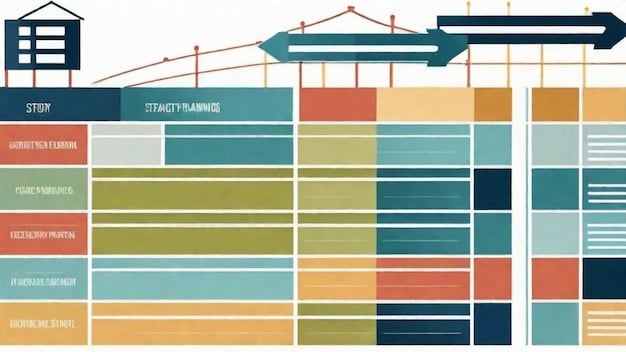Goal Setting: Academic Objectives for Success in 2025

Goal setting is crucial for academic success in 2025, providing direction, motivation, and a framework to achieve defined objectives through strategic planning and consistent effort, ensuring students remain focused and driven toward their educational aspirations.
Are you ready to take control of your academic future? Goal setting is the key to unlocking your potential and achieving your dreams in 2025. Let’s explore how to define your objectives and make them a reality.
Why Goal Setting Matters for Academic Success
Goal setting isn’t just a feel-good exercise; it’s a powerful tool that can transform your academic life. By setting clear, achievable goals, you provide yourself with a roadmap to success.
So, why is it so important? Let’s delve into the core reasons.
Increased Motivation and Focus
Goals provide a sense of purpose. When you know what you’re working towards, you’re more likely to stay motivated. Clear objectives help you prioritize tasks and avoid distractions.
Improved Time Management
With defined goals, you can allocate your time more effectively. You’ll be able to identify which tasks are most important and dedicate the necessary time to complete them successfully.
- Prioritize tasks based on goal relevance.
- Create a study schedule and stick to it.
- Break down large tasks into smaller, manageable steps.
In essence, goal setting provides structure and direction, allowing you to make the most of your time and effort in your academic pursuits.

The Power of SMART Goals in Education
SMART goals are a framework used to create well-defined, actionable objectives. Applying this framework ensures your goals are clear, measurable, and attainable.
Let’s break down what each element means in an educational context.
Specific
A specific goal is clear and well-defined. Instead of saying “I want to improve my grades,” a specific goal would be “I want to achieve an A in my math class.”
Measurable
Measurable goals allow you to track your progress. Quantify your objectives. For instance, “I will complete 20 practice problems each week” is a measurable goal.
- Use grades as a metric.
- Track study hours.
- Assess progress through practice tests.
By creating SMART goals, you transform abstract aspirations into tangible targets, enhancing your chances of achieving them in 2025.
Setting Realistic Academic Goals for 2025
Realism is a critical component of effective goal setting. Setting goals that are too ambitious can lead to frustration and burnout. It’s essential to strike a balance between challenging yourself and setting achievable targets.
How can you ensure your goals are realistic?
Assess Your Current Situation
Take an honest look at your current academic standing. What are your strengths and weaknesses? Where do you need to improve?
Consider Available Resources
Think about the resources available to you, such as tutoring, study groups, and online materials. Make sure your goals align with the resources you can access.
Setting realistic goals also involves recognizing your limitations. It’s about being honest with yourself about what you can realistically accomplish given your circumstances and constraints.

Creating an Action Plan for Your Goals
Once you’ve set your SMART, realistic goals, the next step is to create an action plan. An action plan is a detailed outline of the steps you need to take to achieve your goals.
How do you create an effective plan?
Break Down Your Goals
Divide your larger goals into smaller, manageable tasks. This makes the overall goal less daunting and easier to approach. Each task should be specific and actionable.
Set Deadlines
Assign deadlines to each task. This helps you stay on track and ensures you make consistent progress. Use a calendar or planner to keep track of your deadlines.
- Use a planner to schedule study sessions.
- Set reminders for important deadlines.
- Review and adjust your plan regularly.
Creating a solid action plan transforms your goals from mere ideas into concrete steps, setting you up for success in 2025.
Overcoming Obstacles in Academic Goal Pursuit
The path to academic success isn’t always smooth. You’ll inevitably encounter obstacles along the way. The key is to anticipate these challenges and develop strategies to overcome them.
What are some common obstacles and how can you tackle them?
Procrastination
Procrastination is a major roadblock for many students. Break tasks into smaller steps, use time management techniques, and reward yourself for completing tasks.
Lack of Motivation
When motivation wanes, remind yourself of your goals and why they are important to you. Find study partners or join a study group to stay motivated.
Persistence is crucial when setbacks occur. View them as learning opportunities and adjust your strategies accordingly. Staying resilient can make the difference between success and failure.
Tracking Progress and Staying Accountable
Monitoring your progress is essential for staying on track and making necessary adjustments. Regularly review your goals and action plan to assess your performance.
How can you effectively track your progress?
Keep a Journal
Write down your accomplishments, challenges, and insights. This helps you reflect on your progress and identify areas for improvement.
Use Tracking Tools
Utilize apps or spreadsheets to track your study hours, grades, and task completion. Visualizing your progress can be highly motivating.
- Set regular check-ins to review your progress.
- Adjust your plan as needed.
- Celebrate your achievements to stay motivated.
Accountability also plays a key role. Share your goals with friends, family, or a mentor who can provide support and encouragement. Their feedback can help you stay committed and focused on your objectives for 2025.
Celebrating Success and Learning from Setbacks
Acknowledging your accomplishments is crucial for maintaining motivation and reinforcing positive habits. Take the time to celebrate your successes, no matter how small they may seem.
Equally important is learning from setbacks. Don’t view failures as the end of the road, but rather as opportunities for growth and improvement.
Analyze Your Mistakes
Identify what went wrong and why. This helps you avoid repeating the same mistakes in the future.
Adjust Your Strategies
Based on your analysis, modify your action plan and strategies as needed. Flexibility is key to overcoming challenges.
By celebrating your successes and learning from your setbacks, you create a positive feedback loop that drives continuous improvement and helps you achieve your long-term academic goals in 2025.
| Key Point | Brief Description |
|---|---|
| 🎯 Setting SMART Goals | Create goals that are Specific, Measurable, Achievable, Relevant, and Time-bound. |
| 📅 Action Planning | Break down goals into smaller tasks with deadlines for steady progress. |
| 💪 Overcoming Obstacles | Develop strategies to tackle procrastination and maintain motivation. |
| 🎉 Celebrating Success | Acknowledge achievements and learn from setbacks to fuel future progress. |
Frequently Asked Questions
▼
SMART goals are Specific, Measurable, Achievable, Relevant, and Time-bound. They are crucial for providing clarity, focus, and a framework for academic success by ensuring goals are well-defined and attainable.
▼
Break down your goals into smaller, manageable tasks, assign deadlines to each task, and use a planner to schedule study sessions. Regularly review and adjust your plan.
▼
Break tasks into smaller steps, use time management techniques like the Pomodoro method, and reward yourself for completing tasks. Eliminate distractions and create a dedicated study environment.
▼
Remind yourself of your goals and why they are important. Find study partners or join a study group for support. Celebrate small achievements and focus on progress, not perfection.
▼
Tracking your progress allows you to assess your performance, identify areas for improvement, and make necessary adjustments to your plan. It also provides a sense of accomplishment and motivates you to continue.
Conclusion
By mastering the art of goal setting, you can transform your academic journey in 2025. Set SMART goals, create actionable plans, overcome obstacles, and celebrate your successes to achieve your educational aspirations. Your future is in your hands – start planning today!





